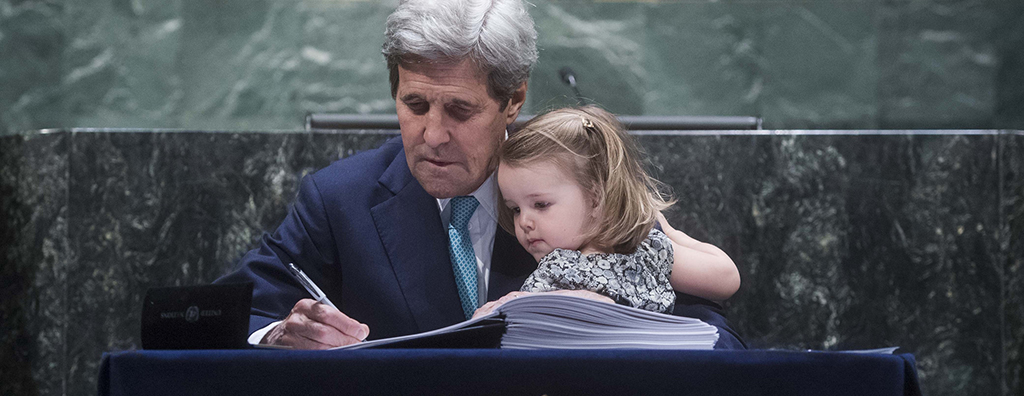
Sticking with Paris, Market Mechanisms are in the Interest of All
Jacoba Aldersebaes, The Climate Trust
As published by California Carbon Info and Sustainable Business Oregon – November 22, 2016
The United States is one of 193 countries that signed the milestone Paris Climate Agreement that aims to reduce global greenhouse gas emissions. As of late November, 112 countries had ratified the agreement and agreed to limit the rise in global temperature to 2 degrees Celsius this century. This is a massive undertaking. In order to accomplish our common goal, all countries need to work together. Article 6 is a key part of the agreement because of its focus on international market mechanisms that could create a global currency of carbon instruments.
There are obvious implications from the recent presidential election that could impact both the environment and the Paris Agreement. President-elect Trump has stated publicly that he believes climate change is not real, and plans to withdraw the U.S. from the Paris Agreement. If the U.S. were to back out, not only would the rest of the world see the continued, and possibly increased, implications of our greenhouse gas emissions, but we would also send a divisive message to the other countries that have already ratified the agreement. Such a move would signal that either the U.S. does not value our shared climate, or that we expect the rest of the world to change, while we continue business as usual—prioritizing the maximization of profits over global wellbeing.
Article 28 of the Agreement gives any country wanting to nullify their participation in the Agreement a four-year waiting period before it can back out. If the U.S. started this process now, it would take until the next administration for the exit to occur. However, there are other pathways available that would circumvent this waiting period, including the use of legal shortcuts that could decrease the timeframe to one year; or leaving the UNFCCC (U.N. Framework Convention on Climate Change) altogether—a treaty originally signed by Republican President George H.W. Bush. Of course, President-elect Trump could also choose to disregard the Agreement completely, which would take no time at all.
If the U.S. does not take part in the Paris Agreement, it follows that it would also withdraw all contributions to any climate finance mechanism as described in Article 9. As outlined, the $100 billion in contributions from developed countries was to be used by the least developed countries and small island states for mitigation efforts. Under the Obama administration, the U.S agreed to contribute to this fund to help other countries meet their Paris obligations. While many speculated that President-elect Trump’s inclination to withdraw from the Paris Agreement would destabilize the talks, encouragingly, every country at the recent Marrakech Climate Conference pulled together and maintained their climate action commitment. However, without U.S. participation in the fund, the ability of these developing countries to reduce their emissions will be diminished.
The importance of Article 6 in the Paris Agreement cannot be overstated, as it opens a path for international greenhouse gas emission reduction markets. The implementation of additional carbon pricing schemes not only opens the markets up for more transactions, but it could also encourage international carbon market linkage. As part of the Agreement, each country was required to submit a plan of action, in which 91 countries specifically called out the use of markets. Carbon markets hold great potential as a greenhouse gas reduction strategy, and the international interest in market mechanisms as a means to comply with the Paris Agreement is incredibly promising.
Continuing our commitment to the Paris Agreement will enable the U.S. to play a leadership role in addressing the international climate crisis. There is potential for the U.S. to mitigate our enormous impact—16% of global emissions, as of 2011—and what’s more, we have an obligation to do so. As a major contributor to the climate crisis facing the world, we cannot now sit it out and rely on others to find a solution without our aid. Having a global currency of carbon instruments will increase demand, and open the possibilities for an expanded carbon market in the U.S.—an important component in lowering emissions, and one that can be brought to fruition through international cooperation.
If President-elect Trump backs out of the Paris Agreement, as expected, the Clean Power Plan, which places pressure on individual states to establish plans to lower CO2 emissions, would most likely be shelved as well. However, even if a national market does not form under the Paris Agreement, and the Clean Power Plan does not encourage individual states to create a market for carbon, states still have the right, and the responsibility, to act of their own accord. It is imperative that we do whatever possible to abide by an Agreement that is in everyone’s best interests as global citizens.
Big business is already getting wise to the need for climate action, with 360 U.S. businesses encouraging a renewed commitment by the Trump administration to stick with the Paris Agreement. Nike and Starbucks, among others, agreed “failure to build a low-carbon economy puts American prosperity at risk.” This is a much different environment from the last time a Republican U.S. President pulled out of an international environmental agreement; the Kyoto Protocol. This time around business and governments will be banding together to address this significant threat.
The possibility of the U.S. withdrawing from the Paris Climate Agreement is real, and it could be a huge setback to the progress made toward lowering greenhouse gas emissions if we let it. Now is not to time to let despair get the best of us and disrupt the progress that has already been made. We need to keep the momentum moving forward by partnering with states, local governments, businesses, and individuals committed to lowering U.S. emissions. It’s time for each of us to step up and let our ambition show.
Image credit: Flickr/United Nations Photo